Dashnor Kaloçi
Memorie.al publishes the rare testimonies of Xhemal Alimehmeti, a former classmate of Ramiz Alia in the Tirana gymnasium during the occupation of the country and one of the main exponents of the Balli Kombëtar Youth, who opposes his former friend of the period of youth, rejecting what Alia had written in his memoirs about the event of the beginning of August 1943, when the Communist Party and the nationalist organization ‘Balli Kombëtar’ gathered in the village of Mukje and signed an agreement between them, e which is known in history as the ‘Mukje Agreement’ which a few days later, would be broken by the senior leadership of the SNP, led by Enver Hoxha. The unknown tract of Balli Kombëtar thrown a few days after that event from the most talked about in the history of Albania, where the leadership of the nationalist organization ‘Balli Kombëtar’, after describing with facts all that happened in Mukje, where as the main point The problem of Kosovo arose, he denied the National Liberation Party, which accused Balli, that: he wanted the separation of power even though he had not fought, giving with facts all the wars that had been fought up to that time by the armed groups of Balli Kombëtar, against the occupying forces Italian, etc.
“What is said in the book: ‘I Ramiz Alia testifies to history’ is not true. ‘ In his testimonies given there regarding the period of the War, Ramiz Alia, deliberately twists the historical truth about the ‘Mukje Agreement’ made by the ‘Balli Kombëtar’ with the Communist Party, at the beginning of August 1943. Not that Ramiz “Alia, I do not know what the truth is about that agreement, but he will not go against what he said for 45 years, his former boss Enver Hoxha, whom he served faithfully.”
This was stated, among others, by Xhemal Alimehmeti, a former political prisoner and classmate of Ramiza Alia, in the Tirana gymnasium during the occupation of the country and one of the main exponents of the Youth of Balli Kombëtar, who said that, no had nothing personal with Ramiz Alia, on the contrary, he is grateful to him, who did not appear as a witness, to aggravate him in court, when he was sentenced in 1945 to five years in political prison.
“But to answer my former classmate, Ramiz Alia, I do not want to speak now. Not that I have no arguments, but that now it is convenient to speak. Therefore I do not want and about what Ramiz says in In his book, I am showing you the treatise issued by the Balli Kombëtar shortly after the Communist Party unilaterally broke that agreement, which became public at that time more than anything that can be said now “, said Alimehmeti, making available to us the tract that Memorie.al publishes in full in this article.
The ‘National Front’ treaty, a few days after the termination of the ‘Mukje Agreement’
Balli Kombëtar has always maintained, in the press, orally and in deeds, a conciliatory, wise and approachable position towards the Communist Party. On the contrary, the latter has always held an offensive and arrogant position towards the National Front.
In recent times the Red Party slanders have culminated in a tract printed on 12 September. Balli Kombëtar does not deny the shock it had when it saw that in that tract his troops were called traitors!
The shock was even stronger because this tract was published after Mukaj’s agreement that Balli Kombëtar made on August 1 and 2 of this year with the so-called National Liberation Party, now we are saying, with this diabolical offspring of the Communist Party, which in scientific words is called autoparthenogenesis.
Now it seems that this Communist Party wants, it is not understood why, to divide the cabbages and believes that the time has come to declare war without mercy on Albanian Nationalism. It seems that the theory of permanent revolution has been completely assimilated by our militant communists.
Now that the matter has reached this critical point, Balli Kombëtar wants the entire Albanian people to be informed about the agreement reached in Mukaj between the two parties. In this village of Central Albania, 12 delegates of the National Front and 12 delegates of the National Liberation Party gathered on 1 and 2 August 1943.
After many talks, an agreement was reached according to which, a joint committee is formed called the Committee for the Salvation of Albania, which aims to:
1) Immediate war against the occupying enemy and against any other eventual enemy.
2) Fight for an Independent and Ethnic Albania.
3) The Committee for the Salvation of Albania falls, with the formation of a provisional government.
4) The form of the regime will be determined by the people themselves.
5) The Committee has, among other attributes, that of the Proclamation of Independence.
6) The first point to be dealt with by the Defensive Committee is the issue of the proclamation of Independence.
7) The Defensive Committee shall be appointed by the eighth day of August.
8) Until the appointment of the Defensive Committee, its duties will be exercised by a provisional committee consisting of 12 people, six from each party.
Without wasting time, the next day the masses of this provisional committee were appointed and on the same day this committee held its first meeting and with a joint tract was announced to the Albanian people for the holy agreement.
After the action in Qafë-Shtamë, Major Abaz Kupi addressed both us and the National Liberation Army with a letter, in which he gave us all the information about the war.
In full agreement of both parties, a tract was issued on behalf of the Committee for the Salvation of Albania with the motto: “Here is death, here is Freedom”.
The tract was drafted exactly as the major himself informed us. The first trick seemed on this occasion, because as after the words we had, the printing of the tracts would be common, every time the action would also be common.
However, the National Liberators especially published a tract of theirs that was drafted differently from what Major Abaz Kupi informed us.
On the seventh of August, the National Liberators, by letter as well as orally, due to unforeseen prohibitions, demanded that the deadline for the formation of the final committee be extended for another six days.
- Balli Kombëtar, sincerely, approved this deadline, telling him that Balli’s persons, who would participate in that definitive committee, had been appointed and that they were leaving for a safe place in Central Albania, where the comrades of the National Liberation Party would be waiting.
- After the deadline expired, on August 15, the center of that party was announced again through the Tirana committee, that our people are waiting and ready to start work.
Our announcement went unanswered as did other announcements made week after week. From the beginning of September, we finally learned that in Orenjë of Çermenika, the National Liberation Party held a big party with drums and saz, and that on this holiday, Balli Kombëtar has been at the center of ridicule, of the orthological swearing of satirical poems, etc., which the people themselves have heard.
After this party, rumors started circulating that the National Liberation Party broke the agreement. We have been asked from time to time to give an explanation on this point.
Not only did the Liberation Party never officially respond to us, but from the mouths of its members, we hear up and down that the connection was broken for the following main reasons:
1) Balli Kombëtar did not take immediate action.
2) The agreement was not made from the bottom-up, but from the top-down.
3) The general center of the party did not approve the connection.
Let us now analyze these reasons.
- Balli has taken action at all times even before the Mukje Agreement. Gjormi’s action with Hysni Lepenica, Mallakstra’s action with Tefik Sfiri, during which Jashar Cakrani was killed, Selenica’s action with Jusuf Luzaj, and many others.
Following the agreement, Hysni Lepenica, Commander-in-Chief of the Southern Prefectures, was ordered to intensify wars against the enemy. And indeed, as soon as he arrived in the country, the Commander began the actions, the most important of which are in turn:
In Dukat, a column of 42 trucks headed for Llogora is attacked. After four hours of fighting, the column was destroyed: 96 killed enemies and 130 captives, who were disarmed and released.
- In Qafën e Dushkut (Gjorm), four trucks are attacked. The enemy is defeated. 12 Italians killed, surplus captured.
- An enemy force of 200 infantry is attacked in Mavrovo. Half of them were killed, the other half disarmed and left free.
- A column of 15 trucks is attacked in Vajza, which is destroyed after two hours of fighting. 76 Italians were killed: the surplus was taken prisoner and after disarming them was released. In these main actions the loot seized is very large, only the machine guns have been 36.
In Central Albania on August 20, Major Xhemal Herri and Rexhep Picalli’s Balli Kombëtar squads, aided by Ishm’s partisan squad, attacked the militarized Belloti company near Tirana. Installations and machinery were blown up. The gangs, after receiving the necessary material for the freedom struggle, burned any other material that remained.
In Northern Albania, in Shkodra, an enemy force consisting of 800-900 Italians, also supported by a treacherous militia, raided the partisan troops in the village of Rec.
The National Front of Shkodra detachments immediately went to the aid of the partisan detachment. The war lasted for 36 hours: the occupier left over 150 dead and withdrew. The young Rifat Tartari and Captain Haxhi Islami were killed by the freedom fighters.
Here are the communist gentlemen: Here is what the National Front has done. Work, work and not words and nonsense.
As for the third reason that the General Center of the Party did not approve the meeting, we believe it because:
This General Center, which is not located in Albania, could not approve a connection that undertook to strive for an Ethnic Albania, as this word is outside the framework of internationalist politics.
We did not expect this at all from the center of the Communist Party, because we believed that with the destruction of the Comintern it would be National as the Communist Party, the self-proclaimed Albanian, had not yet gained its freedom. And after we have finished with the three reasons, we are who we are, let us show a little to our People how the conversation in Mukaj about the work of Ethnic Albania took place.
Four hundred and some men, pages of which the meeting took place, can testify how long the conversation lasted for the editing of the article in which it is said that we will fight (said Balli), that we will try (said the National Liberation), that Kosovo to be united with us for life or death.
In these talks, we are showing, as far as we know, the theses and the reasons of the National Liberators, why they did not want Kosovo to be mentioned.
It is megalomania (greatness mind) to claim Kosovo.
- We do not love Kosovo because the enemy has forgiven us (as).
- We can not ask for Kosovo, because we are in conflict with the Atlantic Charter, in which the word Ethnic was not mentioned.
- If we ask for Kosovo, we also become like Mustafa Kruja, because Mustafa Kruja also wants Kosovo.
- These and other amenities, flourished the conversation of the point of Ethnic Albania. Without then let go of the work of declaring Independence and overthrowing Victor Emmanuel.
The objections of the National Liberators have been severe. The work why they did not want to declare Independence and overthrow Victor Emanuel, for us is and remains a mystery.
Maybe why one of the leaders of the National Liberation continues to think like April 12, 1940, the date on which he in the newspaper “Tomorri” on the third page, in a heartbreaking article, reported the misery of Albania under the hoof of Zog and its salvation and prosperity within the framework of the Roman Empire founded by the Duke.
Or not very honest Mr. Doctor Omer Nishani?
The end of the speech, Balli Kombëtar, invites the Nacional-Çlirimtare to tell us once and for all, even though the Muka agreement was broken: this is important for our Nation, that from now on, it has become so , there was no room left for words. You of the National Liberation Army will be responsible to the Nation for breaking the agreement.
Ramiz Alia’s testimony about Mukje, in the book ‘I Ramiz Alia, testify about history’
“I do not know… However, I believe that Gjinishi and Dishnica, have signed the Mukje Agreement in their head. I will say the reason why. Dishnica and Gjinishi, accepted the formation of the National Salvation Committee, where both sides were put in equal positions.
So, despite the fact that Balli had not fought, he in this agreement was equated with the National Liberation Movement that had organized the war against the Italians. In my opinion this has been the fundamental mistake.
The decision to demolish Mukje was also influenced by the issue of ethnic Albania, which was raised in Mukje. Why do I say this. Look, you probably know Bujan’s decisions. They are not so categorical. Why? There was a reason:
The point was that among the forces fighting against fascism, at that time disagreements or conflicting points should not be the subject of discussion. During the war, the problems that existed between the two sides which fought against fascism could not be solved.
Therefore, raising the issue categorically, as has been done in Mukje, was like throwing the handle of the duel between these two anti-fascist forces. The truth is that there are some points of uncertainty about the Mukje compromise.
An article recently written by Ymer Dishnica, added nothing new. With what instructions did he go to the meeting, where did he violate them, were they the instructions of Enver Hoxha personally, or of the leadership of the National Liberation Front, in what conditions was the decision to denounce the compromise taken, are there written documents for the talks.
These are questions that I do not have clear. For objective circumstances, I do not believe there was an order from Miladin or the top Yugoslav leadership to cancel the Mukje Agreement, because there were communication difficulties.
For example, it took Vasil Shantos three months to go to a meeting with the Yugoslav leadership of the War, from Shkodra to Jajce in Montenegro, where their Headquarters was located. Also, as far as I know, there was no radiogram connection between our Headquarters and the Yugoslav one.
That connection existed only between Vukmanovi Tem Tempos, when he was in Albania, and his Headquarters in Yugoslavia. It is very clear that the demolition of Mukje was not done by Balli. Balli was interested in making Mukja work.
Balli won a lot with Mukje, because without a fight, he won the parity in the decision-making within the National Salvation Committee.
Whether Balli would implement in practice the decision to wage an anti-fascist war, which was one of Mukje’s main points, is another matter. I dont believe. And here’s why.
Suppose the SNP that denounced the Mukje Agreement made a mistake. But why did Balli and Legality join the Germans after Mukje’s failure? Or as the people say: to the wrath of my mother-in-law, I sleep with the mill myself!
It is quite clear that Balli Kombëtar loved Mukje, because he remembered that with the capitulation of Italy, the Anglo-American allies would land in Albania. So the Ballists wanted to be in power as anti-fascist fighters.
When they saw that the allies did not come, but the Italians were replaced by the German Nazis, they returned to the policy of cooperation with the occupier, as they had done before.
“And they used the annulment of the Mukje Agreement to present the National Liberation War as a civil war, provoked and loved by the partisans.” /Memorie.al




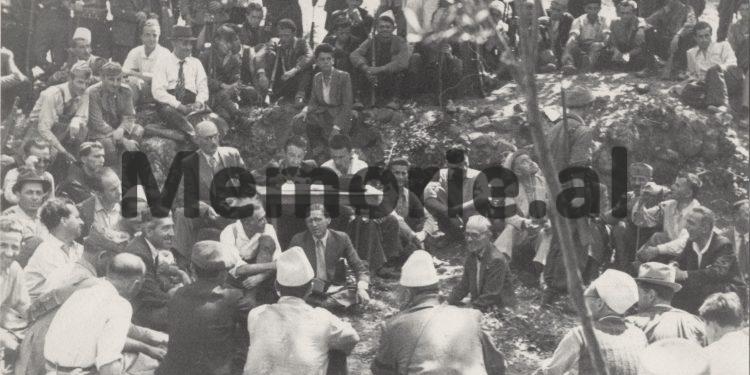
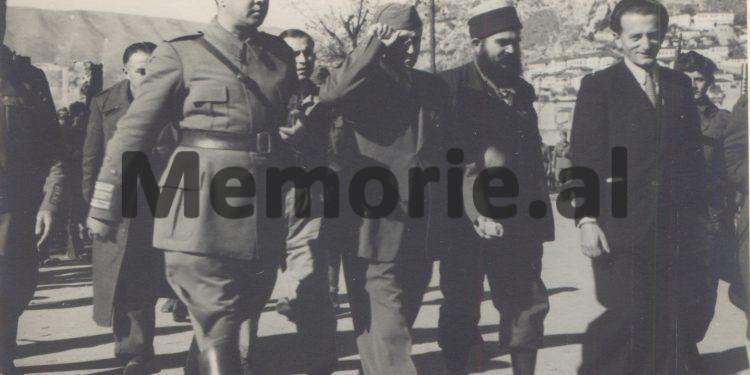
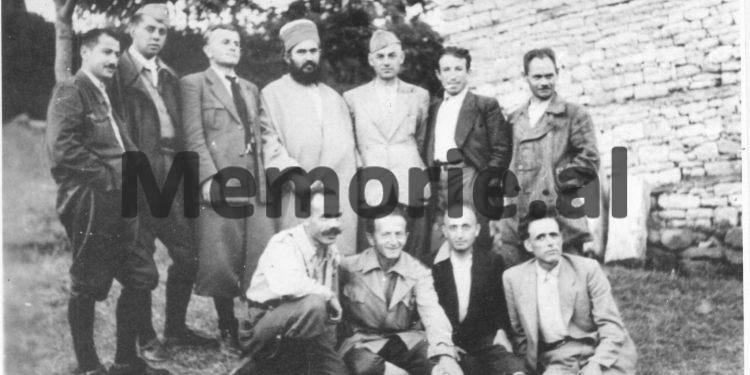
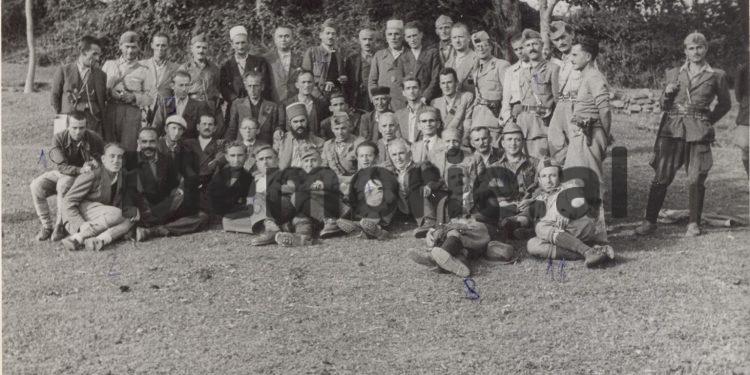
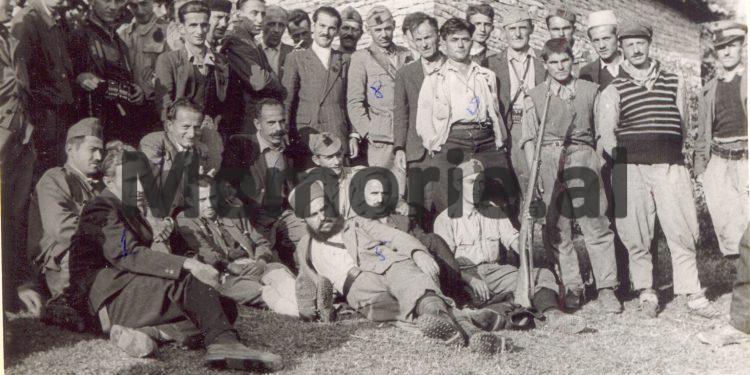
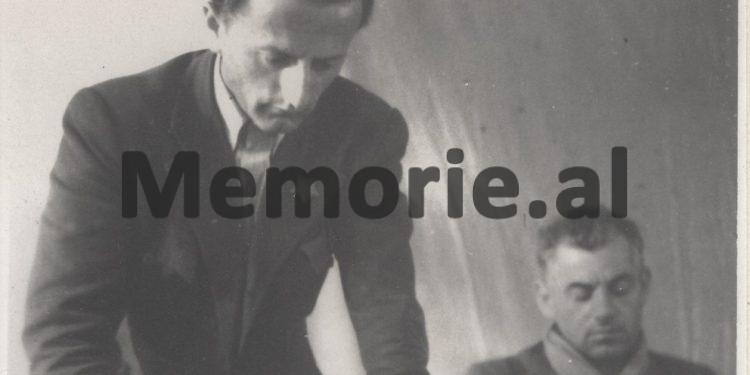
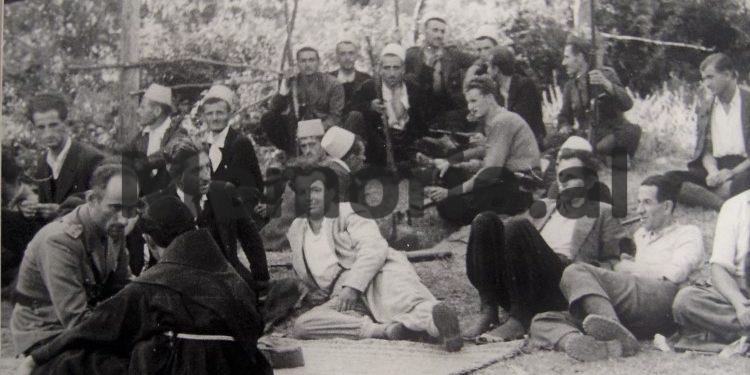
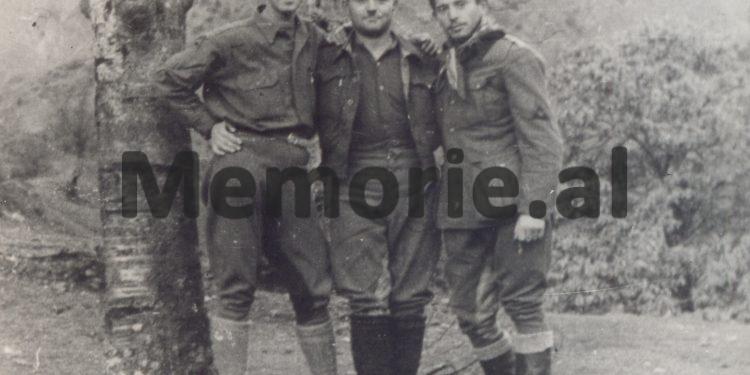
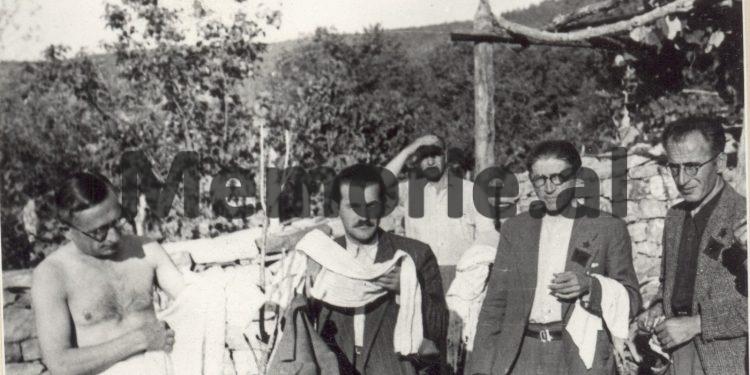

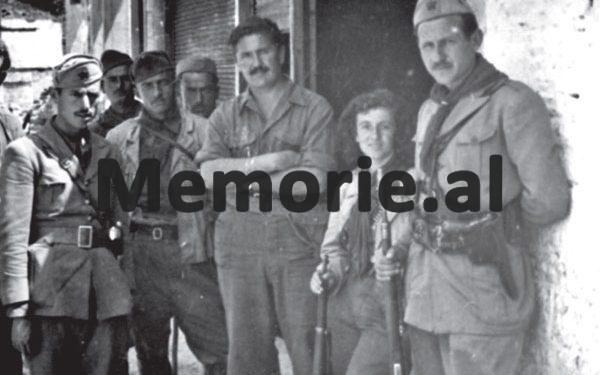
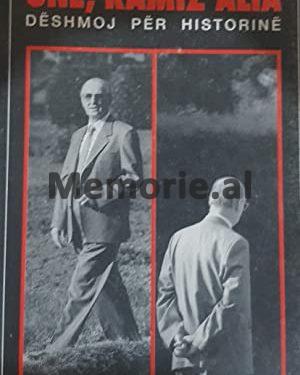
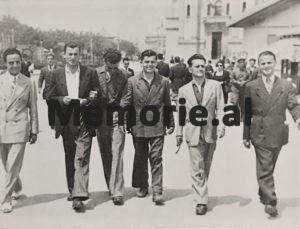
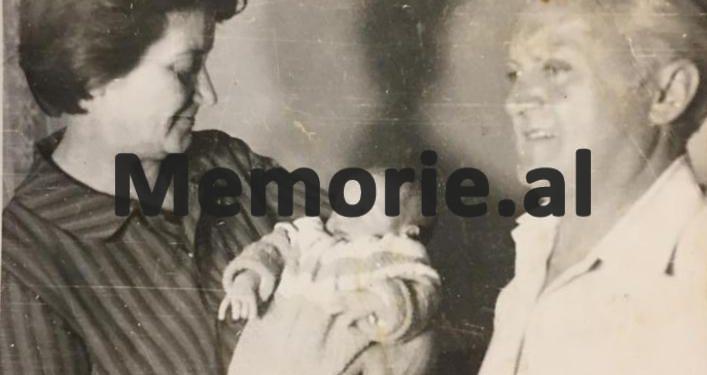

![“The ensemble, led by saxophonist M. Murthi, violinist M. Tare, [with] S. Reka on accordion and piano, [and] saxophonist S. Selmani, were…”/ The unknown history of the “Dajti” orchestra during the communist regime.](https://memorie.al/wp-content/uploads/2026/02/admin-ajax-3-350x250.jpg)
![“In an attempt to rescue one another, 10 workers were poisoned, but besides the brigadier, [another] 6 also died…”/ The secret document of June 11, 1979, is revealed, regarding the deaths of 6 employees at the Metallurgy Plant.](https://memorie.al/wp-content/uploads/2026/02/maxresdefault-350x250.jpg)




